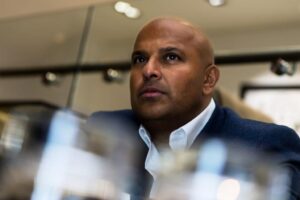Following extensive media coverage in recent weeks of the highly lucrative private equity sale to Exponent of the world’s first Overnight Multiple Merger Model (OMMM), Xeinadin, OMMM creator Feisal Nahaboo is now reporting huge levels of interest in his unique business model—with a forecast of £5bn investment based on the number of planned OMMMs and the level of interest shown by leading large private equity firms to date.
But why is OMMM so revolutionary in the field of mergers & acquisitions (M&A), and what benefits does it have to traditional merger models? In this exclusive article, we find out more about OMMM and why it has been dubbed a “corporate miracle” for good reason.
What is an OMMM?
The brainchild of British entrepreneur Feisal Nahaboo, the OMMM concept is a model through which he consolidates large numbers of individual companies in record time, in order to drive up standards and profits in saturated industries such as pharmacy and accountancy.
They are low-risk, and offer high PAT (profit after tax). Nahaboo’s first OMMM saw him merge 122 independent accountancy firms in just 256 working days, to lawfully consolidate and launch at the stroke of midnight, on 1stJune, 2019 as the leading accountancy firm Xeinadin.
Xeinadin went on to post revenues in May 2020 of £110.3million, and earnings before interest tax depreciation and amortisation (asset repayments) of £39.9million—a figure far higher than that typically seen in the sector. This type of growth typically takes 50-100 years to achieve.
Furthermore, Xeinadin have now commanded an extremely valuable chunk of private investment from private equity firm Exponent.
Although, undoubtedly, the 256 working-day record-breaking venture to consolidate 122 separate firms overnight—dubbed at the time as a “corporate miracle”—was incredibly demanding, Nahaboo realised in the process that this was a model that was fully replicable.
As such, he is now founder and CEO of the world’s second OMMM: the pioneering 100-plus store pharmacy group Alitam.
This OMMM involved a multi-million pound consolidation of over 100 pharmacy stores in the UK and Ireland, with an aspiration to build a FTSE100 company within five years.
The Alitam Group reports a projected £8million of savings to date, achieved through streamlining overheads; shared software licenses and regulation costs; insurance savings; creation of own-brand Alitam products; and a cohesive marketing, promotion and recruitment strategy among others.
The scale of the operation is allowing Alitam to put its bold ‘Pharmacy of the Future’ vision into practice at pace, utilising the existing pharmacy infrastructure and clinical skills of pharmacists to transform the UK’s struggling healthcare system into one focused on prevention and, thereby, improving the health and wellbeing of everyone.
So, two sizeable firms in two saturated sectors, which seemingly came from nowhere to change the paradigm and offer a brave new way of doing things, are increasing profits as surely as they raise standards.
What was unthinkable just 10 years ago within the accountancy sector is now the norm, thanks in no small part to Nahaboo’s OMMM vision.
It is clear to see that when compared with other business models, the OMMM displays clear advantages, and allows for a level of innovation and cross-fertilisation not possible with other traditional merger models such as the popular franchise prototype model.
Small wonder, then, that large investment houses are showing serious interest in the OMMM for it clearly outstrips the franchise model in seven key ways:
High Profits From The Start
The OMMM only purchases established businesses showing high levels of profitability. Over 122 independent and profitable accountancy firms were headhunted for Xeinadin, and over 100 entrepreneurial and innovative pharmacy stores, showing considerable profit, were handpicked for Alitam. Franchisees, on the other hand, are often start-ups with no profit—or, worse, they’re already in debt.
Experts V Trainees
OMMM businesses boast skilled and highly qualified operators. For example, Xeinadin Group is a leading chartered accountancy business with hundreds of qualified accountants and other professionals on its books, all of whom are accountable to the strictures of their regulatory bodies (the ICAEW in England and Wales, for instance). Alitam Group, meanwhile, is a highly regulated pharmacy business, employing a significant number of superintendents and clinically-qualified practitioners. Franchises, in contrast, focus on selling a ‘box of tricks’ and then training the owners in how to use them. Thus, personnel are frequently unqualified at the start and while the industry may be regulated, those procuring the franchisees may not be.
No Debt
The OMMM is outstanding in that each model is designed to have no debt, and no loans, both on consolidation or shortly thereafter. Xeinadin came into being on 1st June, 2019 as a leading accountancy firm, with no debt. Franchisees are likely to carry debt from day one.
Lower Cost
It’s more cost effective to start an OMMM. Both Xeinadin group and Alitam Group were initially built with just three staff (and Xeinadin reportedly from Nahaboo’s kitchen table) with no costly overheads needed. A franchise operation is likely to need a head office earlier on, incurring significantly higher costs than an OMMM.
Built-In Solvency
The OMMM has a solvency plan funded by entrants’ existing business profits. Franchisers are reliant on charging franchisees that have yet to make a profit. The OMMM avoids a debt-ridden model and focuses on using existing profits to fund ongoing solvency.
Values Double Or Even Treble
On entering consolidation, the OMMM is able to double or treble the value of all business subsidiaries as they form a large platform in a saturated market. By contrast, a franchisee entering their model starts to plan for value—a process which could take many years to build.
Community
The OMMM builds a community-minded team of equity directors. All work for the mainstream business, cross-fertilising specialisms and proven methods, and enabling them to roll-out efficiencies and innovations at scale. With Xeinadin, for example, they could swiftly bring a diverse range of professional services under one roof—such as HR, legal, audit, business consultancy, insolvency and corporate finance services. Thus, clients could receive a holistic service, directed and managed from a place they could trust, while subsidiary firms could improve profits through a work ethic of upselling and cross-selling.
Alitam has already commenced the roll-out of a range of clinical services, traditionally offered by a GP, in pharmacies and offered by an independent prescriber.
And, in just one example of its bold move towards a preventative healthcare system, Alitam pharmacies are using their peer-to-peer network of specialist knowledge to plan and prepare for the introduction of highly innovative health services such as pharmacogenomics.
Franchisees, however, are unlikely to constantly work with each other in this way. Typically they are guided by head office, which cannot pass on crucial know-how. In short, franchisees do not benefit from community, or from the knowledge bank built by peers, which is the lifeblood of the OMMM.
The Future Of OMMM
For these reasons, significant numbers of high-quality investors are keen to be part of the OMMM movement.
This is now especially the case since Nahaboo is actively headhunting key executives from top-tier global banks to help monetise the model, and procure steady streams of investment. Recent appointments to the board, which already includes big city names such as Sir Ken Olisa OBE and Dhruv Patel OBE, include former Credit Suisse MD Zachary Brech as the Group’s new chief financial officer (CFO), and Antony Isaacs, former MD of HSBC Global Banking and Markets, as a consultant.
Speaking about the future for OMMM, which is undertaken exclusively by Nahaboo’s Overnight Multiple Merger Group (OMMG), Nahaboo said: “There has never been a more exciting time for the OMMG and her companies.
“The response to the Xeinadin investment, and to the outpouring of updates from Alitam regarding our roll-out of preventative healthcare, has been astonishing.
“It took a bold vision and a great deal of confidence to launch Xeinadin. This was something which had never been done before, but which was executed in world-record time.
“Subsidiary members still thank me for the financial, and professional, rewards they continue to receive.
“And Alitam is poised to play a key role in reducing the 6million NHS waiting list, even slashing it by half, and strengthening the health of our nation through its focus on community-led preventative care.
“The OMMM boasts extraordinary agility and options for ongoing growth. Both Xeinadin Group and Alitam Group have demonstrated that they are ‘pandemic proof’, low-risk and yet high-growth enterprises.
“As we’ve seen, Xeinadin is posting headline-grabbing profits and levels of investment, while Alitam is showing over £100million turnover a year, and growth of over 10 per cent year on year.
“I confidently predict that the OMMM will be a towering presence in the top 10 business models of the future.”
















